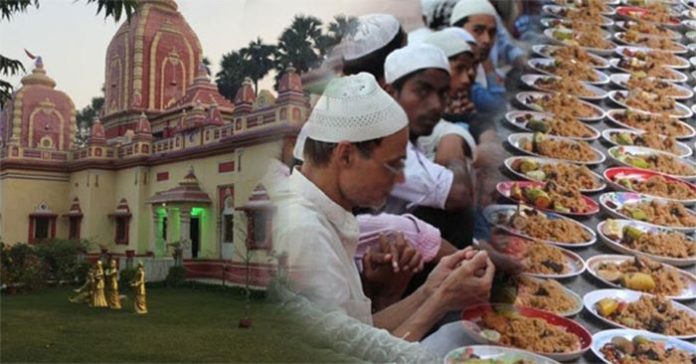Chennai: In a remarkable gesture of communal harmony, a Hindu temple in Chennai has been serving Iftar to Muslims during Ramadan for the past four decades. The Sufi Dar temple, located in Mylapore, continues its long-standing tradition of distributing food to fasting Muslims at the Wallajah Mosque in Triplicane every evening, reported the India Observer.
Volunteers from Sufi Dar, donning traditional Muslim caps, arrive at the Big Mosque daily with an assortment of food items, including fruits, milk, cooked rice, sweets, dates, watermelon, and packaged water. The menu changes regularly, offering meals such as vegetable biryani, channa rice, pulao, and cauliflower rice, ensuring variety for those breaking their fast.
Speaking about the initiative, volunteer Harish Makkar shared that around 1,000 to 1,200 people gather at the mosque each day for Iftar. The temple’s ‘sevadars’ have been serving them faithfully, emphasizing that their efforts are driven by the belief that compassion transcends religious boundaries.
“The Muslim brothers appreciate our efforts,” Makkar said. “We do this as an act of service, knowing that kindness and humanity are above all religious divisions.”
Additionally, the initiative extends its outreach beyond the mosque. Leftover food is distributed among underprivileged Hindus who gather outside, ensuring that the spirit of giving reaches all sections of society.
Sufi Dar stands as a symbol of inclusivity. Its walls are adorned with images of revered figures from various religions, including Muslim Sufi saints, Hindu deities, Jesus Christ, Mother Mary, Guru Nanak, and Sikh gurus. Visitors from different religious backgrounds find solace and familiarity within its premises.
The temple’s tradition was initiated by Dada Ratanchand, a Hindu refugee from Sindh who sought shelter in Chennai following the Partition of India. Over the years, the practice has continued as a testament to communal harmony and mutual respect.
The Wallajah Mosque itself holds historical significance, having been built by Nawab Mohammad Ali Wallajah, an ancestor of the current Prince of Arcot, Nawab Mohammad Abdul Ali.
At a time when divisions often dominate headlines, the selfless service of Sufi Dar temple serves as a reminder of India’s deep-rooted tradition of coexistence. This initiative not only strengthens interfaith relations but also showcases the power of kindness in bridging communities.




